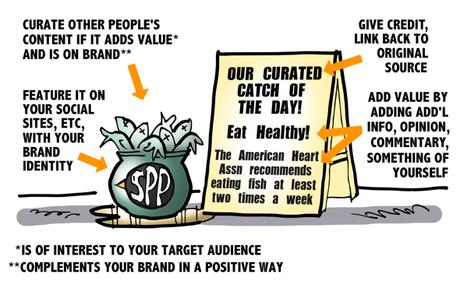“Curating content.” It’s one of those foolish buzzwords (buzz-phrases?) that makes me shake my head. It sounds absurd.
A curator is someone who works in a museum and mounts art exhibitions, right?
Yes– but I did an online search, and, to my surprise, I found the definition has been expanded. It now includes “a person who selects content for presentation, as on a website.“
For a long time, I thought “curating content” was simply sharing a link. You read a post written by somebody else and you think:
My readers (target audience) would enjoy this, and/or find it helpful. So you tweet the link, or post it to your Facebook Page, or share it on LinkedIn.
But curating content is more than “link dumping.” It requires one’s active participation. Let’s take a closer look.
OK, you offer a product or a service. You’re a brand.
One of the challenges for brands, especially small brands, is creating content on a regular basis. Because you’re busy. You need to do your work and serve your customers.
Curating other people’s content takes some of the pressure off: you have something to share, which helps keep your own brand in circulation.
So the first “rule” of curating content is simply: keep an eye out for content that would be a
good fit for both you and your target audience. That is: it relates to what you do, you’d be glad to have your brand associated with it, and it’s something your audience would enjoy or find helpful.
Next, be proactive:
Vet the content. Read it carefully. Did the content live up to the post title? Is it
worth sharing with your readers? Does it provide
fresh insights, or is it just advice they’ve probably heard before?
If you decide to share it, ask yourself: Was it easy to read? Was it well organized? Was it too long, boring in places? Think about editing the content, condensing it down, making it easier to digest. You’ll be doing your readers a favor.
Here’s the
most important part of all: Don’t just share the other person’s content. Don’t just rewrite or reorganize it.
Add something to it. Share your own experience and opinion, maybe an extra tip. You’ll be
sharing something of yourself, and that will resonate with your readers.
Point of fact: I’m doing all that here. This blog post was inspired by Heidi Cohen’s post, How To Curate Content Like A Pro. I’ve condensed it, focused only on what I consider the key points, added editorial comments, and created a summary infographic.
Speaking of which, here’s panel #2:
You want the content to be
associated with your brand (since you’re sharing it), but you need to
credit the original content creator. (If you fail to do so, you’re misrepresenting the situation and taking credit for someone else’s work.)
How do you strike the right balance?
Credit the original creator, and link back to the original post. Include your brand (logo, website) when you publish the curated content.
Another suggestion: Drop the original creator a note and let them know you’ve shared their content. Include a link to same, so they can take a look. Chances are, they’ll share that link with their own followers, which means extra exposure for you and your brand. Plus, it’s a nice courtesy, and a great way to build relationships as you go along.





















